
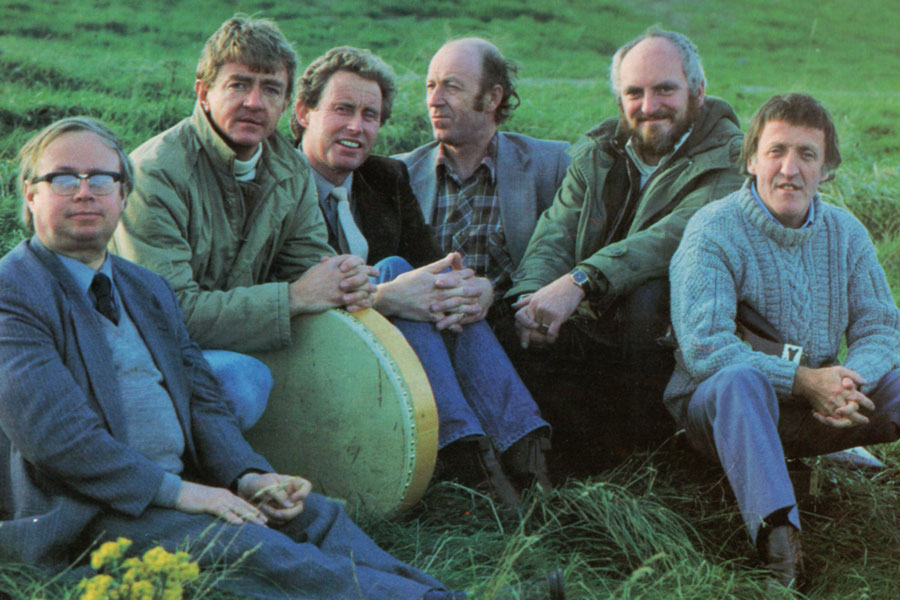
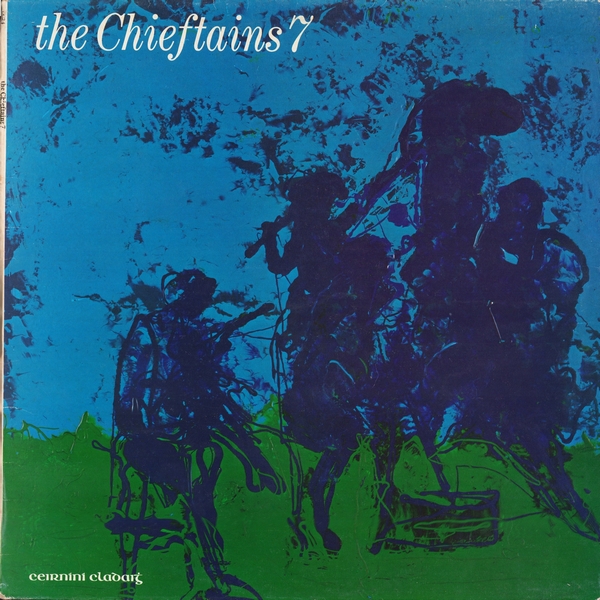 |
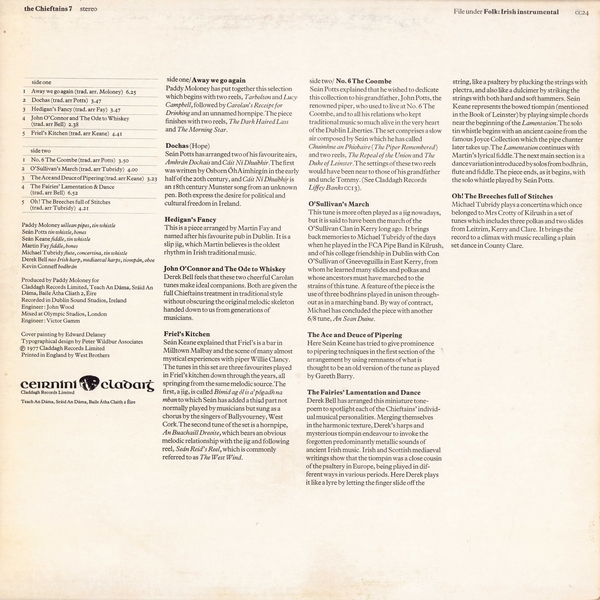
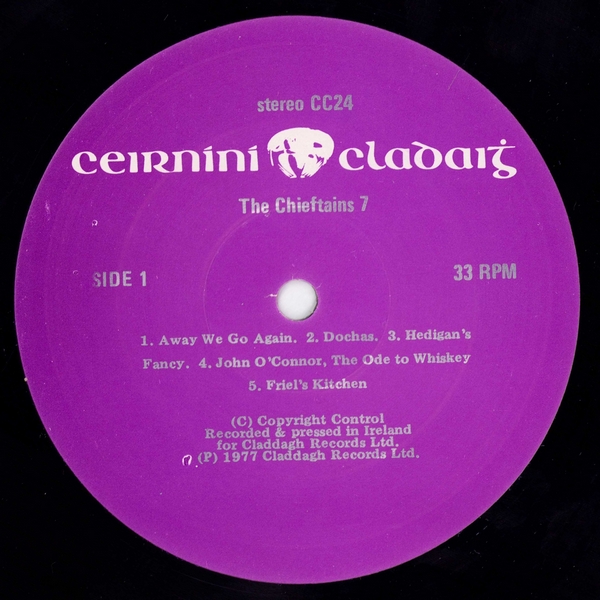
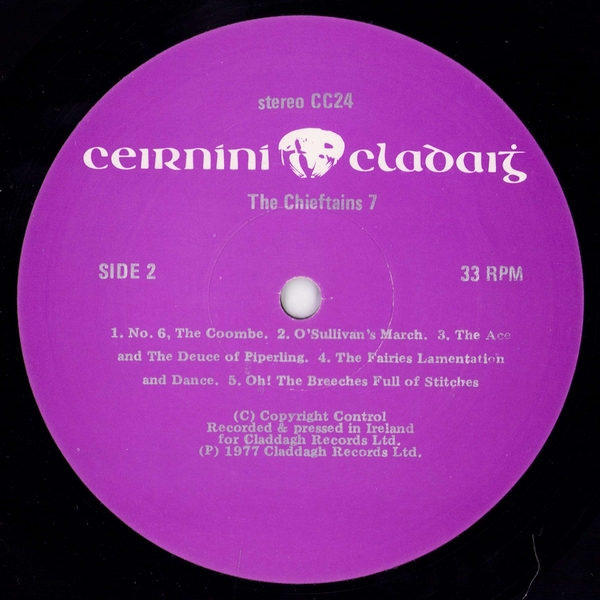 |
Sleeve Notes
Away we go again — Paddy Moloney has put together this selection which begins with two reels, Tarbolton and Lucy Campbell, followed by Carolan's Receipt for Drinking and an unnamed hornpipe. The piece finishes with two reels, The Dark Haired Lass and The Morning Star.
Dochas (Hope) — Seán Potts has arranged two of his favourite airs, Amhrán Dochais and Cáit Ní Dhuibhir. The first was written by Osborn Óh Aimhirgín in the early half of the 20th century, and Cáit NíDhuibhir is an 18th century Munster song from an unknown pen. Both express the desire for political and cultural freedom in Ireland.
Hedigan's Fancy — This is a piece arranged by Martin Fay and named after his favourite pub in Dublin. It is a slip jig, which Martin believes is the oldest rhythm in Irish traditional music.
John O'Connor and The Ode to Whiskey — Derek Bell feels that these two cheerful Carolan tunes make ideal companions. Both are given the full Chieftains treatment in traditional style without obscuring the original melodic skeleton handed down to us from generations of musicians.
Friel's Kitchen — Seán Keane explained that Friel's is a bar in Milltown Malbay and the scene of many almost mystical experiences with piper Willie Clancy. The tunes in this set are three favourites played in Friel's kitchen down through the years, all springing from the same melodic source. The first, a jig, is called Bímid ag ól is a'pógadh na mban to which Seán has added a third part not normally played by musicians but sung as a chorus by the singers of Bally vourney, West Cork. The second tune of the set is a hornpipe, An Buachaill Dreoite, which bears an obvious melodic relationship with the jig and following reel, Seán Reid's Reel, which is commonly referred to as The West Wind.
No. 6 The Coombe — Seán Potts explained that he wished to dedicate this collection to his grandfather, John Potts, the renowned piper, who used to live at No. 6 The Coombe, and to all his relations who kept traditional music so much alive in the very heart of the Dublin Liberties. The set comprises a slow air composed by Seán which he has called Chuimhne an Phiobaire (The Piper Remembered) and two reels, The Repeal of the Union and The Duke of Leinster. The settings of these two reels would have been near to those of his grandfather and uncle Tommy.
O'Sullivan's March — This tune is more often played as a jig nowadays, but it is said to have been the march of the O'Sullivan Clan in Kerry long ago. It brings back memories to Michael Tubridy of the days when he played in the FCA Pipe Band in Kilrush, and of his college friendship in Dublin with Con O'Sullivan of Gneeveguilla in East Kerry, from whom he learned many slides and polkas and whose ancestors must have marched to the strains of this tune. A feature of the piece is the use of three bodhráns played in unison throughout as in a marching band. By way of contract, Michael has concluded the piece with another 6/8 tune, An Seán Duine.
The Ace and Deuce of Pipering — Here Seán Keane has tried to give prominence to pipering techniques in the first section of the arrangement by using remnants of what is thought to be an old version of the tune as played by Gareth Barry.
The Fairies' Lamentation and Dance — Derek Bell has arranged this miniature tone-poem to spotlight each of the Chieftains' individual musical personalities. Merging themselves in the harmonic texture, Derek's harps and mysterious tiompán endeavour to invoke the forgotten predominantly metallic sounds of ancient Irish music. Irish and Scottish mediaeval writings show that the tiompán was a close cousin of the psaltery in Europe, being played in different ways in various periods. Here Derek plays it like a lyre by letting the finger slide off the string, like a psaltery by plucking the strings with plectra, and also like a dulcimer by striking the strings with both hard and soft hammers. Seán Keane represents the bowed tiompán (mentioned in the Book of Leinster) by playing simple chords near the beginning of the Lamentation. The solo tin whistle begins with an ancient caoine from the famous Joyce Collection which the pipe chanter later takes up .The Lamentation continues with Martin's lyrical fiddle. The next main section is a dance variation introduced by solos from bodhrán, flute and fiddle. The piece ends, as it begins, with the solo whistle played by Seán Potts.
Oh! The Breeches full of Stitches — Michael Tubridy plays a concertina which once belonged to Mrs. Crotty of Kilrush in a set of tunes which includes three polkas and two slides from Leitrim, Kerry and Clare. It brings the record to a climax with music recalling a plain set dance in County Clare.